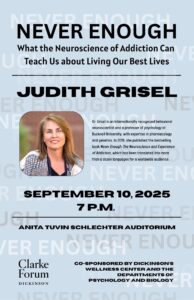Anita Tuvin Schlechter Auditorium, 7 p.m.
This program will not be livestreamed. It will, however, be recorded for future viewing via Dickinson login on our website.
 Never Enough: What the Neuroscience of Addiction Can Teach Us About Living Our Best Lives
Never Enough: What the Neuroscience of Addiction Can Teach Us About Living Our Best Lives
Judith Grisel, Bucknell University
Most chemicals that people use to medicate or enhance reality have both risks and benefits, at different times and for different people. Nonetheless, regular use of any mind-altering substance causes the exact opposite states to a drug’s original effects. Chronic stimulants result in lethargy, sedatives lead to anxiety and insomnia, and euphoriants guarantee misery. Dr. Grisel will explain how the brain adapts to addictive drugs by creating the states of craving, tolerance, and dependence that characterize addiction. She’ll address the synergistic influences of genetic predispositions, childhood trauma, and drug exposure during periods of brain development that make some people more vulnerable than others. These general principles will be applied to illustrate specific risk factors and neural changes associated with cannabis use, and conclude by illustrating how advances in neuroscience can help to reduce suffering from addiction.
This program is sponsored by the Clarke Forum for Contemporary Issues and co-sponsored by the Wellness Center and the departments of biology and psychology.
Topic overview written by Ella Layton ’26
 Biography (provided by the speaker)
Biography (provided by the speaker)
Dr. Judy Grisel’s research on the use and abuse of recreational drugs began during adolescence. After hitting bottom and getting clean and sober in her twenties, she wondered “Why me?”. On her journey to answer that question, she went on to earn a doctorate and is now an internationally recognized behavioral neuroscientist and a professor of psychology at Bucknell University with expertise in pharmacology and genetics. In 2019, Judy published a bestselling book Never Enough: The Neuroscience and Experience of Addiction, which has been translated into more than a dozen languages for a worldwide audience.
